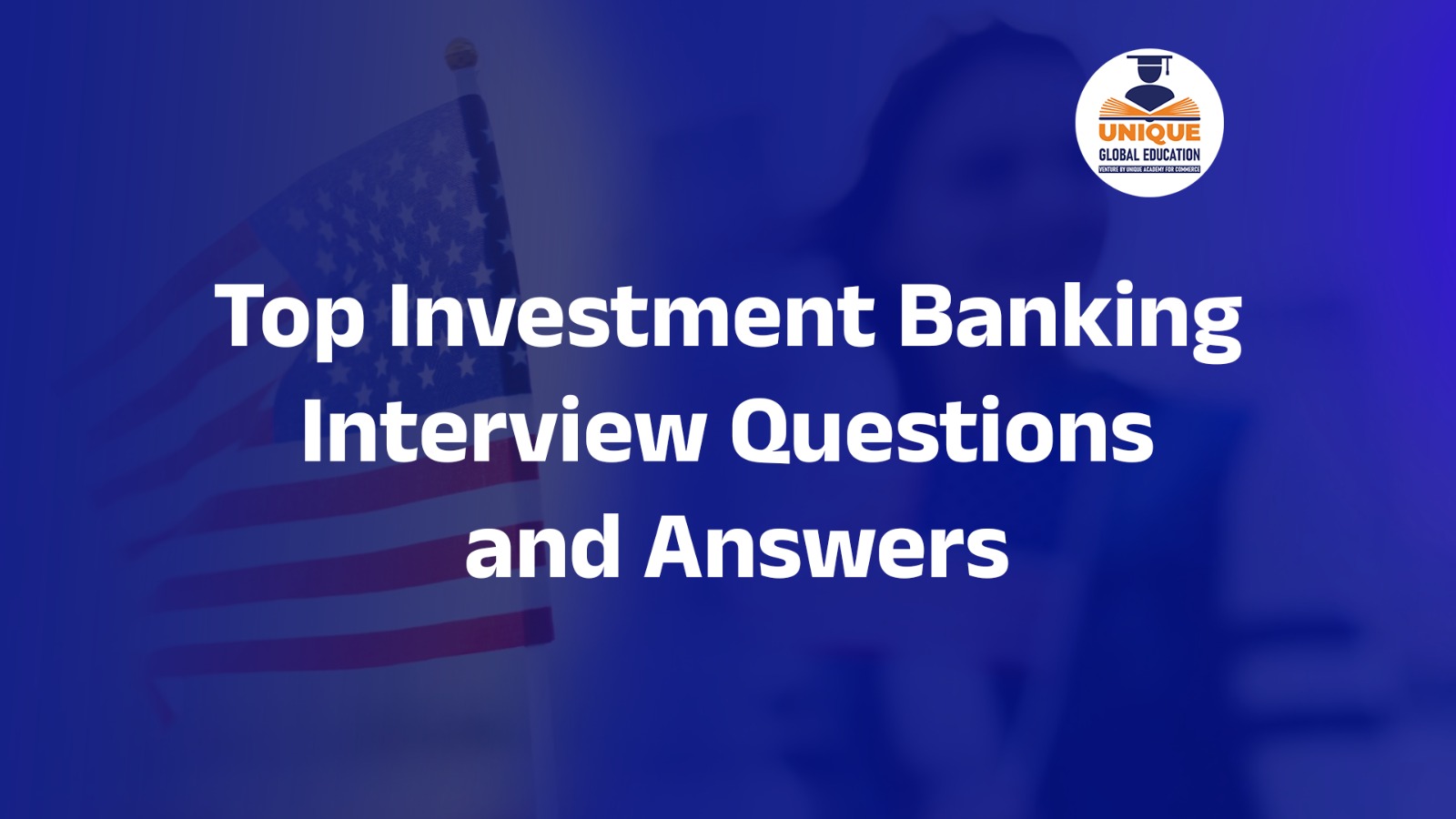No doubt, investment banking is the most competitive career in finance. Because whether you’re interviewing for an analyst position, summer internship, or junior associate role, you’ll be asked a mix of technical skills, behavioural questions, as well as fit questions with the firm.
In this blog we have collated Top 27 Investment Banking Interview Questions and Answers – if you are an aspiring Investment Banker then join the 3000+ job seekers and professionals who have already downloaded this resource and stood out in their interviews.
Table of Contents
Technical Questions (Finance & Valuation)
No doubt, investment banking is the most competitive career in finance. Because whether you’re interviewing for an analyst position, summer internship, or junior associate role, you’ll be asked a mix of technical skills, behavioural questions, as well as fit questions with the firm.
In this blog we have collated Top 27 Investment Banking Interview Questions and Answers – if you are an aspiring Investment Banker then join the 3000+ job seekers and professionals who have already downloaded this resource and stood out in their interviews.

Technical Questions (Finance & Valuation)
1. Can you walk me through a DCF?
Answer:
A DCF model is used to value a company based on the present value of its future cash flows.
Steps:
- Project unlevered FCF (typically 5–10-year time frame)
- Calculate terminal value
- Discount both using WACC
- Include them in the enterprise value calculation
- Reduce net debt for equity value
2. What are the 3 financial statements?
Answer:
- Income Statement: It tells you the profitability of a company over a period of time.
- Balance Sheet: Provides a stock at a point in time.
- Cash Flow Statement: Accounts for cash inflow/outflow from operations, investment, and finance
3. What is the connection among the three financial statements?
Answer:
- The income statement feeds into the balance sheet and the cash flow statement.
- Balance sheet changes are reflected in the cash flow statement as working capital changes.
4. What is EBITDA? Why is it important?
Answer:
EBITDA = Earnings Before Interest, Taxes, Depreciation and Amortization.
It is a measure of a company’s core profitability and is used in valuation and leverage analysis.
5.How do you calculate enterprise value (EV)?
Answer:
EV = Equity Value + Net Debt + Minority Interest + Preferred Stock – Cash
It is a measure of the entire value of a company, including debt and equity.
6. What are some common valuation methods?
Answer:
- Discounted Cash Flow (DCF)
- Comparable Company Analysis
- Precedent Transactions
- LBO (Leveraged Buyout) Analysis
- Market Valuation (Market Cap)
7. Why might a company with higher revenue have a lower valuation?
Answer:
Revenue alone doesn’t reflect profitability. A business with low margins, high debt or weak cashflow can be worth less despite generating greater revenue.
8. What’s the difference between equity value and enterprise value?
Answer:
Equity Value is what stockholders actually own.
Enterprise Value is the total value of a company, taking into account debt. EV is commonly used in comparing stock prices among companies regardless of how they have capitalized themselves.

9. What happens to a company’s valuation if working capital increases?
Answer:
If working capital increases, free cash flow in DCF decreases which also decreases the valuation (holding all other factors constant).
Get Details for US CMA Online & Face to Face Batches
10. What is WACC and why is it used?
Answer:
WACC (Weighted Average Cost of Capital) All funds supplied = equity +debt) is expected to bring the average return to obtain by all investors. It is used to bring back future cash-flow in a DCF.
Behavioural & Fit Questions
11. Why do you want to do investment banking?
Answer:
Refer to, say, a combination of interest in financial markets, a love for high-impact deals, desire for a quick learning environment, and long-term career ambitions cantered around finance.
12. Tell me about yourself.
Answer:
Briefly present your academic history, some of your most important internships/projects, your skills in relation to investment banking.
Example:
I graduated with a degree in finance from XYZ University. I did an internship at ABC Capital where I did some market research and pitchbooks work. I like solving financial problems and I want to start my career in a challenging, fast paced company like IB.
13. Why should we hire you?
Answer:
Draw attention to your analytical skills, attention to detail, work ethic and the capacity to work in high-pressure teams. With examples of your past performance to back it.
14. What’s your greatest strength?
Answer:
For instance: “I know how to take complicated financial information and make it actionable.” I wrote a sector report when I was an intern, and the senior analysts used that to find undervalued stocks.”
15. What’s your biggest weakness?
Answer:
Be honest but strategic.
Example: “I used to bite off more than I could chew in tasks, but I’ve learned to better prioritize and communicate expectations.”
16. How do you deal with long hours and pressure?”
Answer:
If you can, then say you are comfortable with tight deadlines and are eager to learn. Show that mentally you can handle the IB lifestyle.
17. Give me an example of a group project you participated in.
Answer:
Demonstrate collaboration, communication and conflict resolution using the STAR method (Situation, Task, Action, Result).
Market & Industry Awareness
18. What’s a deal you’ve followed recently?
Answer:
Investigate some big M&A, IPO or restructuring. Discuss the deal size, who is involved in the transaction, what the parties are trying to accomplish and whether you believe it is a good idea.
19. What is the impact of increasing interest rates on investment banking?
Answer:
Less M&A in IPO action on account of higher borrowing expenditures
Valuations lower as discount rates discount rates up for the DCFs increase
Rebound in volatility has implications for timing and appetite around deals

20. What do you think of the market as it stands now?
Answer:
Tell us a little about what you think about inflation, Fed policies, recession fears, IPO trends or tech valuations. Support it with one or two facts.
Brain Teasers & Logical Thinking
21. What would you do if I gave you ₹100 to invest?
Answer:
Show logic, not a magic portfolio.
Example: “I’d divide it among low-risk and high growth segments — ₹60 in diversified ETFs, ₹20 in emerging markets and ₹20 in tech or healthcare stocks.”
22. Why are manhole covers round?
Answer:
Classic logic test.
Answer: “Because a round cover can’t fall through its opening and is easier to move and center.”
23. Pitch me a stock.
Answer:
Pick an established, sound company. Mention:
- Business model
- Growth potential
- Financials PE ratio, etc.)
- Why it’s undervalued or well positioned in its industry
24. Explain beta in simple terms.
Answer:
Beta measures how a stock moves compared to the market.
Beta > 1: More volatile
Beta < 1: Less volatile
25. How do you value a private company?
Answer:
Use:
- DCF
- Comparable company analysis
- Precedent transactions
- There is no market price, so you estimate based on peers.
26. Leaveraged Buyout (LBO) – What is it?
Answer:
A leveraged buyout is when a company buys another one with a big slug of borrowed money. The debt is repaid with the assets/ cash flow of the target. It’s common in private equity.
27. where do you see yourself in five years?
Answer:
A good answer shows commitment, drive for success and financial passion:
“My own vision is being a partner running transactions, training juniors and helping build the firm strategically.”

How to CRACK the IB Interview?
- Keep every answer tight and formatted
- Understand the new deals and trends driving mergers and acquisitions, and the strategic considerations behind them.
- Prepare 2–3 stock pitches before hand
- Craft and Jog Thought through narratives for “Why IB”: Personal and Career-oriented
- Refresh your memory on Excel, valuation methodologies, and fundamental accounting
Final Thoughts
Investment banking interviews are not only a test of knowledge — but of your poise, reasoning, intellectual curiosity and work ethic. Thanks to these 27 that you’ll get to prepare responses to for any interview you walk into feeling more confident and polished.
Get Details for US CMA Online & Face to Face Batches



